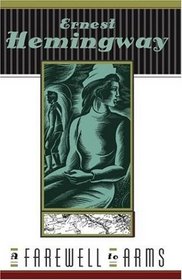Helpful Score: 4
Written in an almost childlike journalistic style, this book gives a glimpse into WWI that Hemingway saw first hand. If you research the themes of the book, it becomes even more meaningful. I'm glad I read it.
Helpful Score: 3
Yes, it's a classic. Did I like it? Not so much. Hemingway's writing style to me is much like a person writing in a second language, clunky and without grace. However - I'm glad I read it - it was the first Hemingway that I've read and I will try others.
Helpful Score: 3
This book is by far one of my favourite books I've read. Hemingway's way of writing is completely different from what you're probably used to. This book was read by my sophomore class in my high school, and my teacher awarded me this book for my excellent review on it. I recommend this book to anyone who's into a different style of writing, and romance in war times. It's beautifully crafted with a twisted storyline.
Helpful Score: 2
I appear to be in the minority here, but I really didn't like this book at all. I forced myself to finish it because I did want to know what happened in the end, but it took an effort to get through. His writing style is unusual, I didn't particularly care for it. The characters in the book were all rather flat and lacking in personality, particularly the character of Catherine, his great love. I found myself questioning why he would love her at all, she had no thoughts or feelings of her own, her only desire in life was to be whatever she needed to be in order to please him.
I did find the descriptions of life at the front during World War I interesting. If you are interested in this time period the book is worth reading because it gives a sense of what the daily life of a soldier might have been like. However, if you are looking for a great love story, I wouldn't recommend this book.
I did find the descriptions of life at the front during World War I interesting. If you are interested in this time period the book is worth reading because it gives a sense of what the daily life of a soldier might have been like. However, if you are looking for a great love story, I wouldn't recommend this book.
Helpful Score: 1
The story is not much about war actions but how the soldiers in Italy and differents countries cope with the war. it's a story about love, friendship, honor.
Story is told in short sentences with a lot of humor!!
Different but good!
Story is told in short sentences with a lot of humor!!
Different but good!




